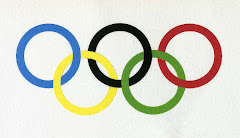
It wasn’t meant to be this way. The last time that Great Britain finished above Australia in the Olympic medal table was 1988. Those were the days when Margaret Thatcher lived at 10 Downing Street, Liverpool won the league title and Bob Hawke was taking time out from setting the world record for drinking a yard of ale to put in a stint as Prime Minister of Australia. Such was the confidence of the Australian politicians prior to Beijing that their Sports Minister Kate Ellis struck a bet with the British Sports Minister Gerry Sutcliffe that the representative of the country finishing lower in the medal table would wear the colours of the other at a public event. John Coates, the head of the Australian Olympic Committee, struck a similar bet with Lord Moynihan, his British counterpart, where the loser would pay the winner in bottles of champagne for each difference in the final medal count. It’s tough being a politician thinking of all these ingenious bets. Come the half way point in competition and the pressure was beginning to show on Coates who commented on the British swimming performance, "not bad for a nation with no pools and not much soap." Coates certainly has a keen eye for detail when he notes that the lack of swimming pools can be of detriment to producing champion swimmers. However, for a man that admitted offering thousands of dollars to IOC members the night before the Olympics were awarded to Sydney he should certainly be used to playing dirty.
Australia’s Olympic nadir took place in Montreal in 1976. A meagre total of five medals with no gold led to a feeling of national humiliation. The response was the opening in 1981 of the state funded Australian Institute of Sport. It heralded a change in fortunes for the Australian Olympic team with the forty medal barrier broken in 1996 and maintained ever since. The Australians had struck gold and the Department of Foreign Trade and Affairs (DFTA) was telling anyone that wanted to log on to their website, “The Australian sports system is unique and one of the most successful in the world. Sporting institutions across the globe emulate Australian programs, and Australian coaches and sports administrators are employed by many organisations and countries around the world.”
Following the completion of the Beijing Games the Australian team returned home to something slightly less than a heroes welcome. Sport is something to be celebrated in Australia as long as they are winning and finishing behind Team GB was not in the plan. In Britain all this winning has come as something of a shock. Gone were the years where you could name all the British Olympic medallists. Now they didn’t fill merely the cockpit of the plane home but each step down to the tarmac – and those were just the cyclists. It may take some time for Britons to come to terms with all this winning but fortunately the Premiership has returned to our screens just in time to remind us what the highest paid and most exposed sportsmen in our land are really capable of when they put their minds to it. Still, a concerned Australian Prime Minister, Kevin Rudd announced his intention to review Olympic sports funding and in an unusual twist conduct a feasibility study of adopting the UK lottery funded system. Although this approach is unlikely to work in Australia because the critical mass of gamblers is a third of that in the UK it’s novel to see the Australian sports machine looking to the motherland for ideas. Perhaps they should re-energise the sporting grass roots and follow the lead set by various British governments in selling off school playing fields and removing any semblance of competition in school sports.
Annoyed glances have also been cast at several Australian coaches for daring to lend their expertise to the British Olympic resurgence. It is of course quite wrong for an Australian professional to seek employment in Britain. In the same way it is wrong for a Dutchman to coach the Australian football team to a World Cup, outrageous that a Kiwi be appointed to introduce the Wallaby forwards to a scrum machine or for a Russian to guide an Australian to a pole-vaulting gold in Beijing. Did someone mention double standards?
If Australia’s reaction to Britain’s Olympic success was somewhat lacking in grace and manners then France reacted with bitterness. No doubt still smarting from Paris’ failure to win the right to host the 2012 Olympics the French have now had to contend with their cross-channel neighbours comprehensively outperforming them in Beijing. Bernard Laporte, the French sports minister, commented graciously "We aren't just going to concentrate our means on four or five sports to bring home the medals, like the British have done." Of course he misses the fact that British medals were spilt across eleven sports but Laporte, lest we forget, is a man with pommes frites on both shoulders. That is one for each occasion when the highly fancied French rugby union team, of which he was coach, were comprehensively out-psyched and out-muscled by the English in the 2003 and 2007 rugby world cups.










